Cecilia Valdés: Love, Race, and a Historical Portrait of Cuba || Review (Eng/Esp)
I have an unusual fascination with stories about women, both real and literary, which drives me to continue my series of reviews on novels named after female characters. Among them, there is one that resonates especially deeply in the hearts of those of us who live in this land I call home: Cecilia Valdés or El Ángel Hill, by Cirilo Villaverde.
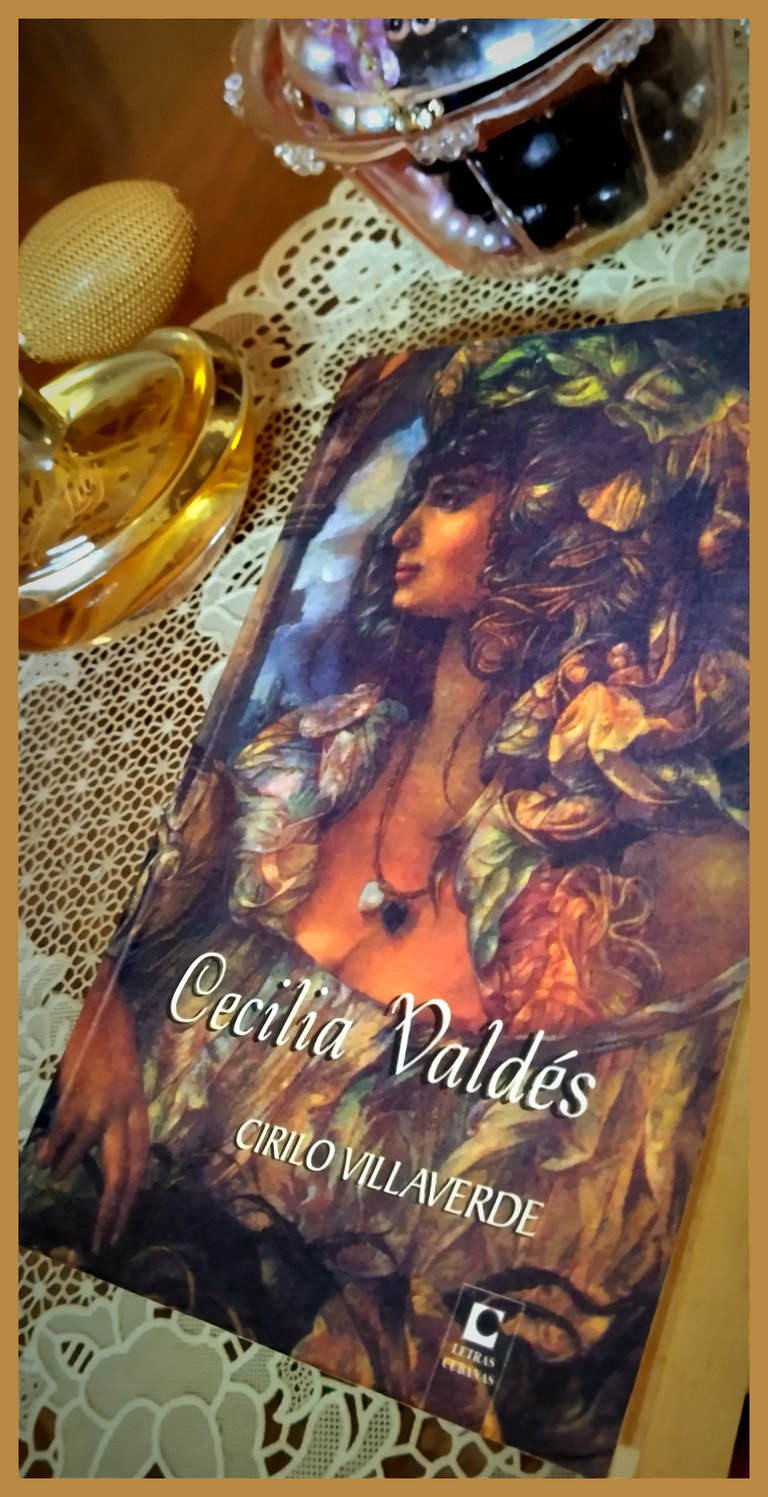
This work is considered the foundational novel of Cuban literature, as it not only portrays the drama of a mixed-race woman in colonial society but also encapsulates the very essence of Cuba: its racial mixing, its contradictions, and its struggle for identity.
For a Cuban woman like me, rereading this novel is an act of reconnecting with my roots, a pride that stands firm in its pages like a banner of who we are.
I am privileged to own this edition of Cecilia Valdés, obtained over twenty years ago at a literary workshop gathering. That gift was not just a book but an acknowledgment of my love for literature and, above all, for our national literary heritage. This edition, with its scent of aged paper, is a personal treasure that holds not only a story but also a piece of my own journey as a reader and writer.
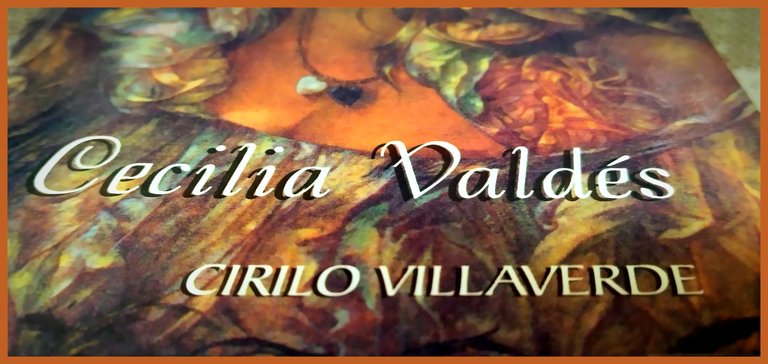
Published in its definitive version in 1882, Cecilia Valdés is much more than a tragic love story—it is a vivid mural of 19th-century Cuba, where racism, social hierarchies, and colonial tensions intertwine with the sensuality and violence of a boiling island.
Cecilia, the protagonist, is a beautiful and seductive mixed-race woman, but she is also a victim of her time. Unaware of her own origins as the illegitimate daughter of a Spanish magnate, she falls in love with her half-brother, Leonardo Gamboa, leading to a cruel ending.
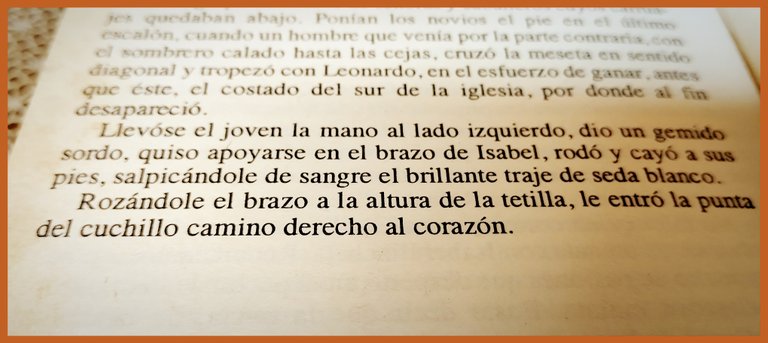
Villaverde does not merely present us with a heroine; he turns her into a symbol of a divided nation. Her beauty and defiance reflect the spirit of a people who, though oppressed, never stopped fighting for their freedom.
One of the novel's greatest achievements is its meticulous depiction of colonial Havana, which becomes another character: oppressive, sensual, and full of contrasts, much like Cecilia herself. For us Cubans, this novel is a journey back in time.
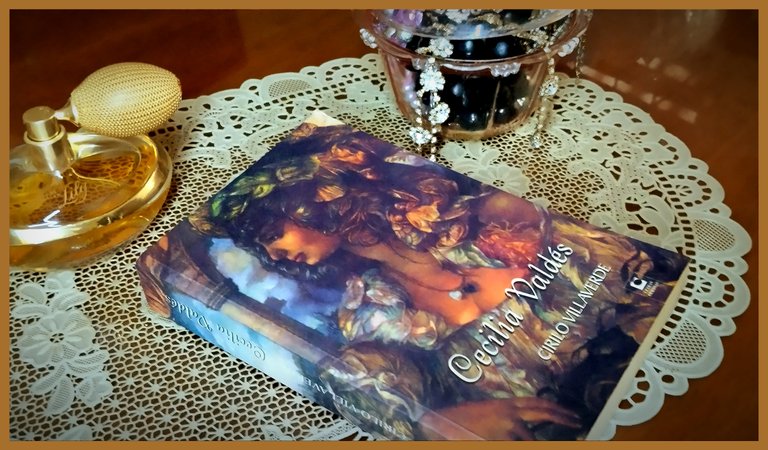
The true greatness of the work, though some may dismiss it as romantic melodrama, lies in its fierce critique of slavery and the colonial system. Cecilia’s story exposes the hypocrisies of a society that condemned racial mixing while benefiting from it. The scene of a mixed-race child sold into slavery, or Cecilia’s own tragic fate, strikes the reader’s heart directly, reminding us that this novel is not just literature—it is also history.
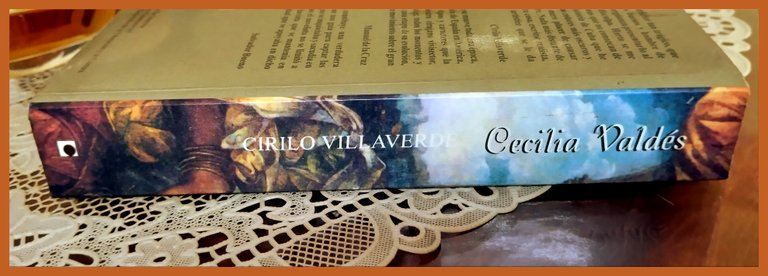
Rereading Cecilia Valdés today, and writing about it after so many years, has been a rediscovery. It is no longer just the novel I studied in school but a mirror in which I recognize myself as Cuban. Cecilia, with her contradictions and strength, is an enduring symbol of what it means to be mixed-race, Caribbean, and rebellious.

Other reviews of this series👇🏻
https://ecency.com/hive-180164/@neuropoeta/eugenie-grandet-books-we-inherit
https://ecency.com/hive-180164/@neuropoeta/one-woman-one-book-one
https://ecency.com/hive-180164/@neuropoeta/the-forgotten-bronte-why-agnes


✨ 𝑻𝒉𝒂𝒏𝒌𝒔 𝒇𝒐𝒓 𝒓𝒆𝒂𝒅𝒊𝒏𝒈! ✨
𝑰𝒇 𝒚𝒐𝒖 𝒅𝒐𝒏’𝒕 𝒌𝒏𝒐𝒘 𝒎𝒆 𝒚𝒆𝒕—𝑰’𝒎 𝒂 𝑪𝒖𝒃𝒂𝒏 𝒏𝒆𝒖𝒓𝒐𝒍𝒐𝒈𝒊𝒔𝒕 𝒂𝒏𝒅 𝒘𝒓𝒊𝒕𝒆𝒓, 𝒂 𝒎𝒐𝒕𝒉𝒆𝒓, 𝒂 𝒘𝒐𝒎𝒂𝒏, 𝒂𝒏𝒅 𝒂 𝒅𝒓𝒆𝒂𝒎𝒆𝒓 𝒘𝒉𝒐’𝒔 𝒇𝒐𝒖𝒏𝒅 𝒊𝒏 𝑯𝒊𝒗𝒆 𝒂 𝒃𝒆𝒂𝒖𝒕𝒊𝒇𝒖𝒍 𝒔𝒑𝒂𝒄𝒆 𝒕𝒐 𝒔𝒐𝒂𝒓.
𝑨𝒍𝒍 𝒕𝒆𝒙𝒕 𝒂𝒏𝒅 𝒊𝒎𝒂𝒈𝒆𝒔 𝒂𝒓𝒆 𝒎𝒚 𝒐𝒓𝒊𝒈𝒊𝒏𝒂𝒍 𝒄𝒓𝒆𝒂𝒕𝒊𝒐𝒏𝒔, 100% 𝒉𝒖𝒎𝒂𝒏-𝒎𝒂𝒅𝒆 (𝒏𝒐 𝑨𝑰).
𝑩𝒂𝒏𝒏𝒆𝒓 𝒅𝒆𝒔𝒊𝒈𝒏𝒆𝒅 𝒃𝒚 𝑳𝒖𝒎𝒊𝒊.
𝑳𝒐𝒗𝒆𝒅 𝒕𝒉𝒊𝒔 𝒑𝒐𝒔𝒕? 𝑼𝒑𝒗𝒐𝒕𝒆, 𝒄𝒐𝒎𝒎𝒆𝒏𝒕, 𝒐𝒓 𝒓𝒆𝒃𝒍𝒐𝒈 𝒕𝒐 𝒔𝒑𝒓𝒆𝒂𝒅 𝒕𝒉𝒆 𝒘𝒊𝒏𝒈𝒔 𝒐𝒇 𝒄𝒓𝒆𝒂𝒕𝒊𝒗𝒊𝒕𝒚! 💛
VERSIÓN EN ESPAÑOL
Cecilia Valdés: amor, mestizaje y un retrato histórico de Cuba || Reseña
Tengo una fascinación inusual por las historias de mujeres, tanto reales como de personajes literarios, lo que me impulsa a continuar mi serie de reseñas de novelas con nombre de mujer. Dentro de ellas, hay una que resuena con especial fuerza en el corazón de quienes habitamos esta tierra donde vivo: Cecilia Valdés o La Loma del Ángel, de Cirilo Villaverde.

Esta obra es considerada la novela fundacional de la literatura cubana, pues no solo retrata el drama de una mulata en la sociedad colonial, sino que encapsula la esencia misma de Cuba: su mestizaje, sus contradicciones y su lucha por la identidad.
Para una cubana como yo, releer esta novela es un acto de reencuentro con mis raíces, un orgullo que se sostiene en sus páginas como un estandarte de lo que somos.
Tengo el privilegio de poseer esta edición de Cecilia Valdés, obtenida hace más de veinte años en un encuentro de talleres literarios. Aquel regalo no fue solo un libro, sino un reconocimiento a mi amor por las letras y, sobre todo, por nuestra literatura nacional. Esta edición, con su olor a papel añejo, es un tesoro personal que guarda no solo una historia, sino también un pedazo de mi propia trayectoria como lectora y escritora.

Publicada en una edición definitiva en 1882, Cecilia Valdés es mucho más que una historia de amor trágico: es un mural vivo de la Cuba decimonónica, donde el racismo, las jerarquías sociales y las tensiones coloniales se entrelazan con la sensualidad y la violencia de una isla en ebullición.
Cecilia, la protagonista, es una mulata hermosa y seductora, pero también víctima de su tiempo. Ignorante de su propio origen como hija ilegítima de un potentado español, se enamora de su medio hermano, Leonardo Gamboa, desencadenándose así un final cruel.

Villaverde no solo nos presenta a una heroína, sino que hace de ella el símbolo de una nación dividida. Su belleza y su rebeldía reflejan el espíritu de un pueblo que, aunque oprimido, nunca dejó de luchar por su libertad.
Uno de sus mayores logros es la descripción minuciosa de la Habana colonial, que llega a convertirse en un personaje más: opresiva, sensual y llena de contrastes, como la propia Cecilia. Esta novela es un viaje en el tiempo para nosotros, los cubanos.

La verdadera grandeza de la obra, aunque algunos puedan acusarla de melodrama romántico, es su crítica feroz a la esclavitud y al sistema colonial. La historia de Cecilia sirve para exponer las hipocresías de una sociedad que condenaba el mestizaje mientras se beneficiaba de él. La escena del niño mulato vendido como esclavo, o el destino trágico de la propia Cecilia, son golpes directos al corazón del lector, recordándonos que esta novela no es solo literatura, sino también historia.

Releer Cecilia Valdés hoy, además de comentar sobre ella después de tantos años, ha sido redescubrirla. Ya no es solo la novela que estudié en la escuela, sino un espejo en el que me reconozco como cubana. Cecilia, con sus contradicciones y su fuerza, es un símbolo imperecedero de lo que significa ser mestiza, caribeña y rebelde.

Otras reseñas de esta serie 👇🏻
https://ecency.com/hive-180164/@neuropoeta/eugenie-grandet-books-we-inherit
https://ecency.com/hive-180164/@neuropoeta/one-woman-one-book-one
https://ecency.com/hive-180164/@neuropoeta/the-forgotten-bronte-why-agnes


✨ ¡𝑮𝒓𝒂𝒄𝒊𝒂𝒔 𝒑𝒐𝒓 𝒍𝒆𝒆𝒓! ✨
𝑺𝒊 𝒂ú𝒏 𝒏𝒐 𝒎𝒆 𝒄𝒐𝒏𝒐𝒄𝒆𝒔: 𝒔𝒐𝒚 𝒏𝒆𝒖𝒓ó𝒍𝒐𝒈𝒂 𝒚 𝒆𝒔𝒄𝒓𝒊𝒕𝒐𝒓𝒂 𝒄𝒖𝒃𝒂𝒏𝒂, 𝒎𝒂𝒅𝒓𝒆, 𝒎𝒖𝒋𝒆𝒓 𝒚 𝒔𝒐ñ𝒂𝒅𝒐𝒓𝒂 𝒒𝒖𝒆 𝒆𝒏𝒄𝒐𝒏𝒕𝒓ó 𝒆𝒏 𝑯𝒊𝒗𝒆 𝒖𝒏 𝒉𝒆𝒓𝒎𝒐𝒔𝒐 𝒆𝒔𝒑𝒂𝒄𝒊𝒐 𝒑𝒂𝒓𝒂 𝒗𝒐𝒍𝒂𝒓.
𝑬𝒍 𝒕𝒆𝒙𝒕𝒐 𝒚 𝒍𝒂𝒔 𝒊𝒎á𝒈𝒆𝒏𝒆𝒔 𝒔𝒐𝒏 𝒅𝒆 𝒎𝒊 𝒂𝒖𝒕𝒐𝒓í𝒂, 100% 𝒉𝒖𝒎𝒂𝒏𝒐𝒔 (𝒔𝒊𝒏 𝑰𝑨).
𝑩𝒂𝒏𝒏𝒆𝒓 𝒅𝒊𝒔𝒆ñ𝒂𝒅𝒐 𝒑𝒐𝒓 𝑳𝒖𝒎𝒊𝒊.
¿𝑻𝒆 𝒈𝒖𝒔𝒕ó 𝒆𝒔𝒕𝒂 𝒑𝒖𝒃𝒍𝒊𝒄𝒂𝒄𝒊ó𝒏? 𝑽𝒐𝒕𝒂, 𝒄𝒐𝒎𝒆𝒏𝒕𝒂 𝒐 𝒓𝒆𝒃𝒍𝒐𝒈𝒖𝒆𝒂 𝒑𝒂𝒓𝒂 𝒂𝒚𝒖𝒅𝒂𝒓 𝒂 𝒅𝒆𝒔𝒑𝒍𝒆𝒈𝒂𝒓 𝒆𝒔𝒕𝒂𝒔 𝒂𝒍𝒂𝒔. 💛
¡Un premio sin dudas invaluable y merecido!
¡Gracias por esta hermosa reseña por cierto!
No sé si merecido, pero recuerdo cuando me lo dieron. Imagina que yo tenía una edición viejita en dos tomos, y ya sin carátula... Una versión que me habían prestado y luego me la había quedado... Y cua do me regalan está como premio, yo con mi adicción por los libros, imagina lo feliz que me sentí 🤭😉😁
Lo imagino sin dudas.
¡Felicitaciones nuevamente!
!INDEED
Congratulations @neuropoeta! You have completed the following achievement on the Hive blockchain And have been rewarded with New badge(s)
Your next target is to reach 800 comments.
You can view your badges on your board and compare yourself to others in the Ranking
If you no longer want to receive notifications, reply to this comment with the word
STOPCheck out our last posts:
Oh, aquí sí tocaste una fibra sensible. Cecilia fue en la adolescencia mi heroína envidiada y llorada. Melodrama romántico sí y qué, la vida real está llena de ellos. Pero si no fuera por ella no conoceriamos esa voz Habana que describes y que hoy no es tan diferente salvo los matices temporales.
Y otra cosa es que yo leo Cecilia Valdez y la veo con la cara de Deysi Granados, y a Leonardo Gambia, como Inmanol Arias... Esa película marcó un antes y un después
I know less about Cuba this book could be interesting for me to learn new things about the world 😁
This book is set in Cuba when it was still a colony of Spain, and slavery filled its streets. A mixed-race woman dares to fall in love with a Creole man, a man of high social standing. It’s a portrait of Cuba in those days, and I know you’ll enjoy reading it because it’s a love story—one of those that is also universal.